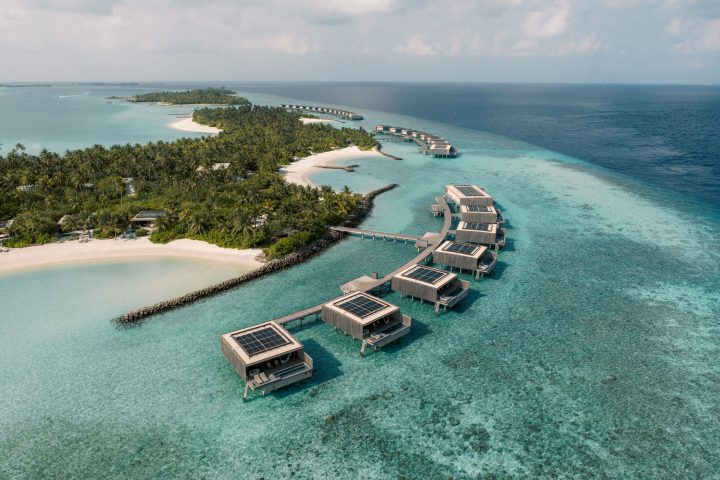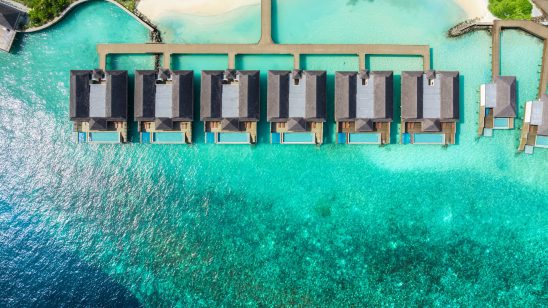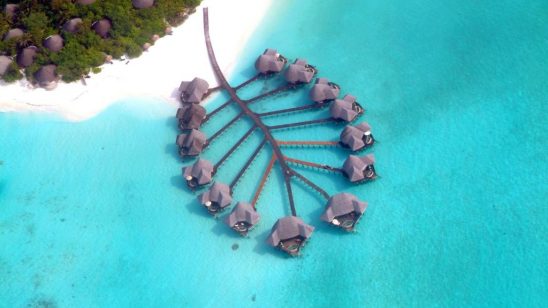
Fari Islands strengthens commitment to net zero with major solar expansion
Fari Islands—a visionary four-island archipelago in the Maldives, home to luxury hospitality brands such as The Ritz-Carlton Maldives, Patina Maldives by Capella Hotel Group, and the innovative Fari Campus—is advancing its journey toward a net zero future. In a significant stride for its renewable energy ambitions, the destination is set to triple its photovoltaic (PV) capacity in 2025, bringing total solar output to 6.4 megawatt-peak (MWp). Once operational, the solar infrastructure will be capable of supplying up to 50% of the islands’ energy needs on sunny days, with average penetration expected to remain just under that figure due to variable weather conditions.
Since its inception in 2021, the Fari Islands project—developed by Singapore-based Pontiac Land Group—has been rooted in sustainable architecture and low-impact construction. Recognised as the world’s largest hospitality project using offsite Mass Engineered Timber construction, the development avoided over 6,000 tons of carbon emissions during production and transportation. All villas were prefabricated to minimise marine impact, and designed with flat rooftops to accommodate solar panels, diverging from traditional Maldivian thatched structures. Sustainability remains central across the islands’ operations.
David Tsang, CEO of Pontiac Land Group, emphasised the company’s long-term commitment to sustainable development, stating, “This renewable energy expansion marks a significant milestone in our sustainability journey. By embracing clean energy, we are taking tangible steps to reduce our carbon footprint and support progress in the hospitality and tourism industries.”
Partnering with Swimsol, a leader in marine floating solar technology, Fari Islands is undertaking one of the region’s largest solar initiatives. Key projects expected to be completed by the end of 2025 include:
- Floating Solar System at Fari Campus: A 40-platform ocean-based installation featuring 2,160 PV panels, contributing 1,037 kWp—approximately 24% of the destination’s total energy demand. This system will include a dedicated battery house and is scheduled for completion in Q4 2025.
- Land-Based PV Systems at Fari Campus: An expanded network of solar panels now totaling 1,200 kWp installed across 19 residential and community buildings that serve the island’s staff.
- Solar Roof Expansion at The Ritz-Carlton Maldives: In 2024, the resort added panels to all 61 Ocean Villas and subsequently to its back-of-house facilities, Beach Shack restaurant, and Dive Centre, achieving a total capacity of 983 kWp. The resort has been awarded the 2024 Green Globe Certification and the Forbes VERIFIED Responsible Hospitality badge for exceeding sustainability benchmarks.
Oscar Postma, General Manager of The Ritz-Carlton Maldives, remarked, “We are proud to contribute meaningfully to the Fari Islands’ collective sustainability goals. Our partnership with Swimsol moves us closer to our shared net zero targets.”
- Patina Maldives Solar Milestone: By 2025, the property is projected to operate fully on solar energy during daylight hours. The resort has installed 2,994 kWp of solar panels, with 980 kWp on an eastern land bank and the remainder on rooftops across villas, F&B venues, the FLOW Spa, and other resort infrastructure. An additional 2 MWh of battery storage is included to enhance energy resilience. Patina Maldives has earned back-to-back EarthCheck Silver Certifications and the Forbes VERIFIED Responsible Hospitality badge.
Anthony Gill, General Manager of Patina Maldives, stated, “Each milestone reaffirms our team’s dedication to conscious luxury and environmental responsibility. Together with Swimsol, we are shaping a cleaner, more sustainable future for the Maldives and the world.”
Through innovative infrastructure, strategic partnerships, and a united vision, Fari Islands is setting a new benchmark for sustainability in the global hospitality landscape.






